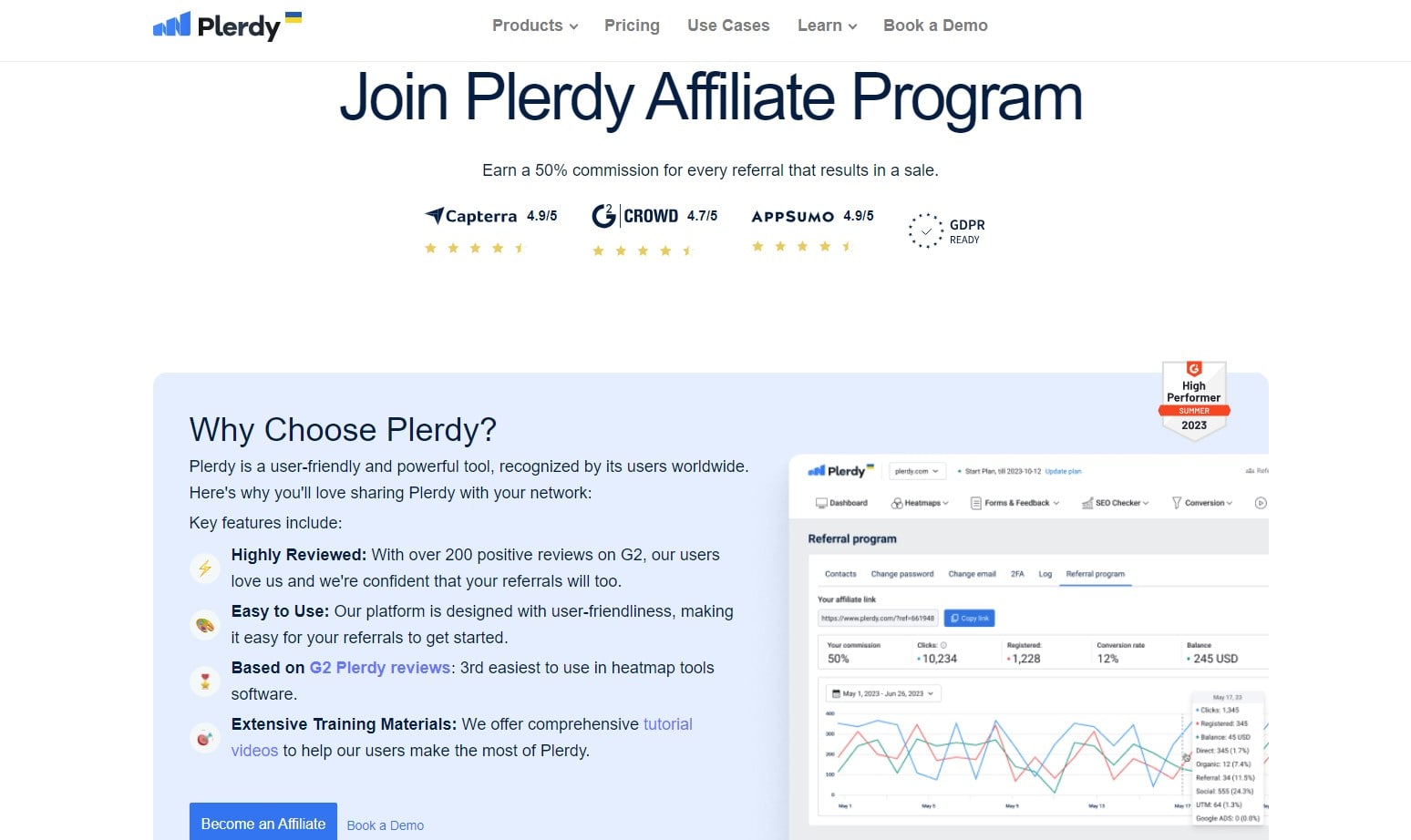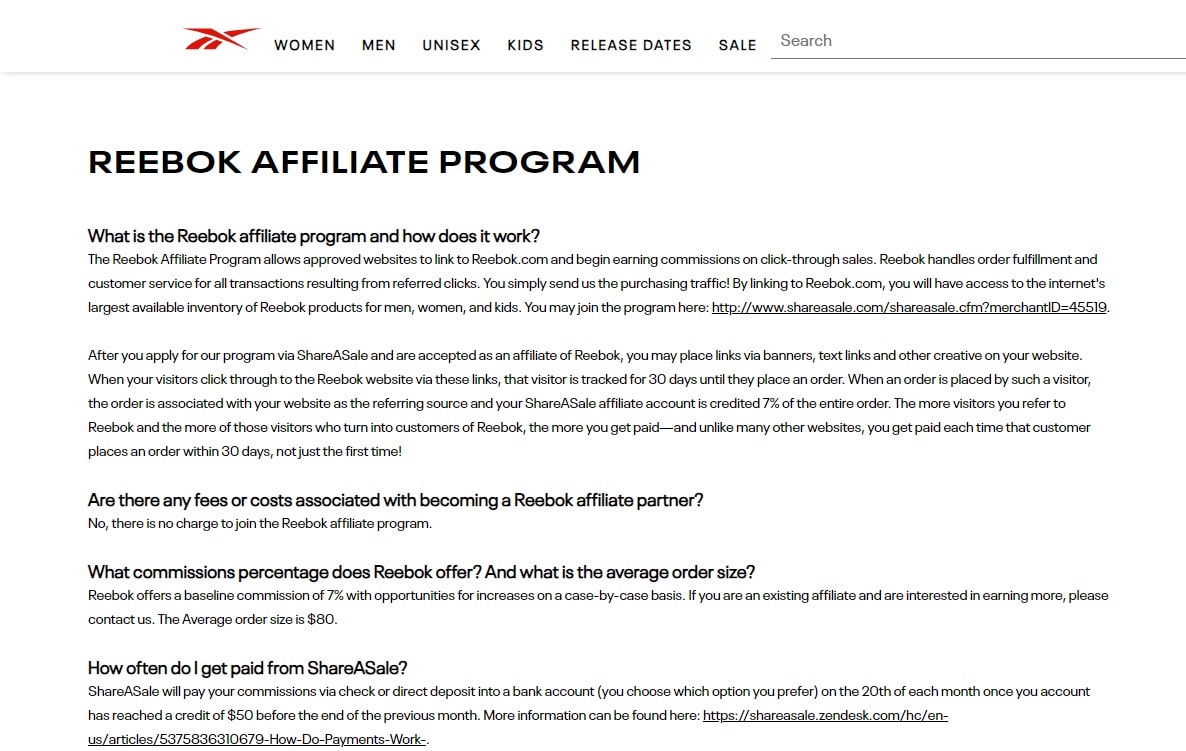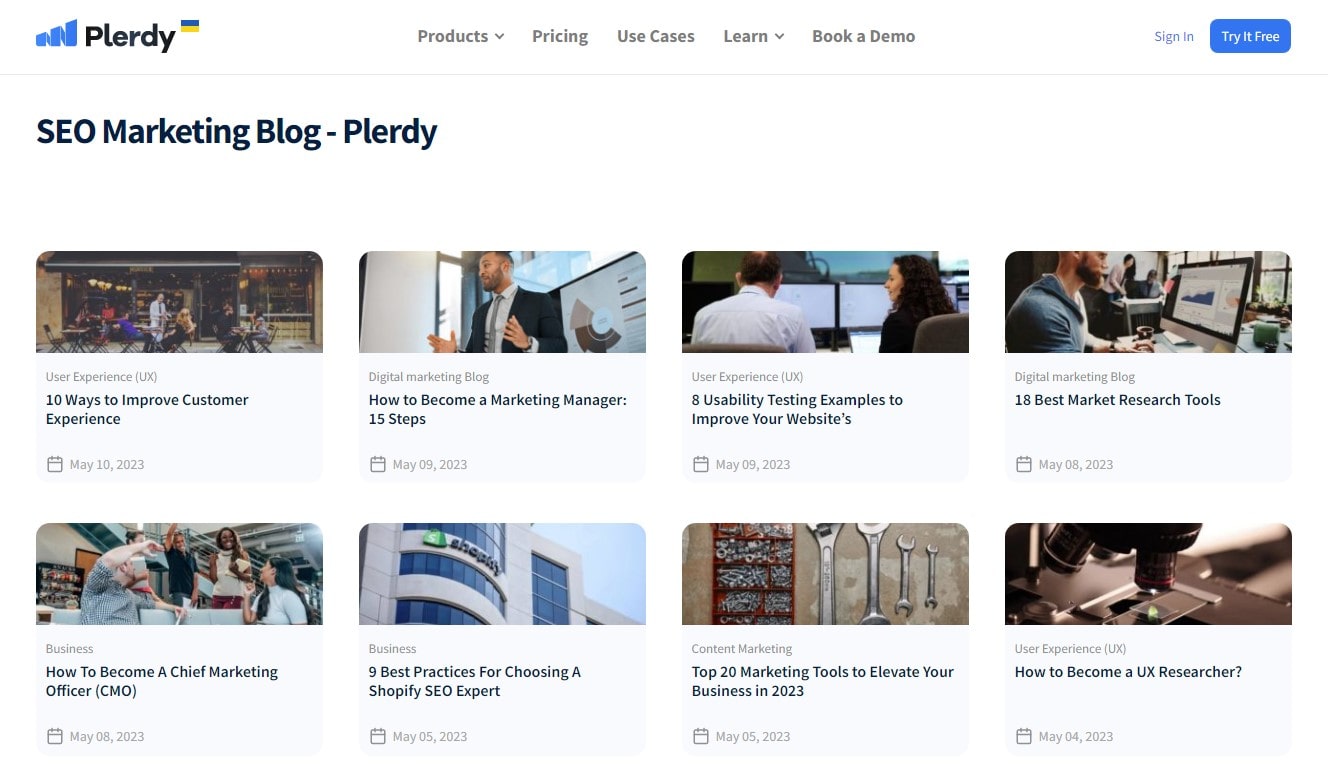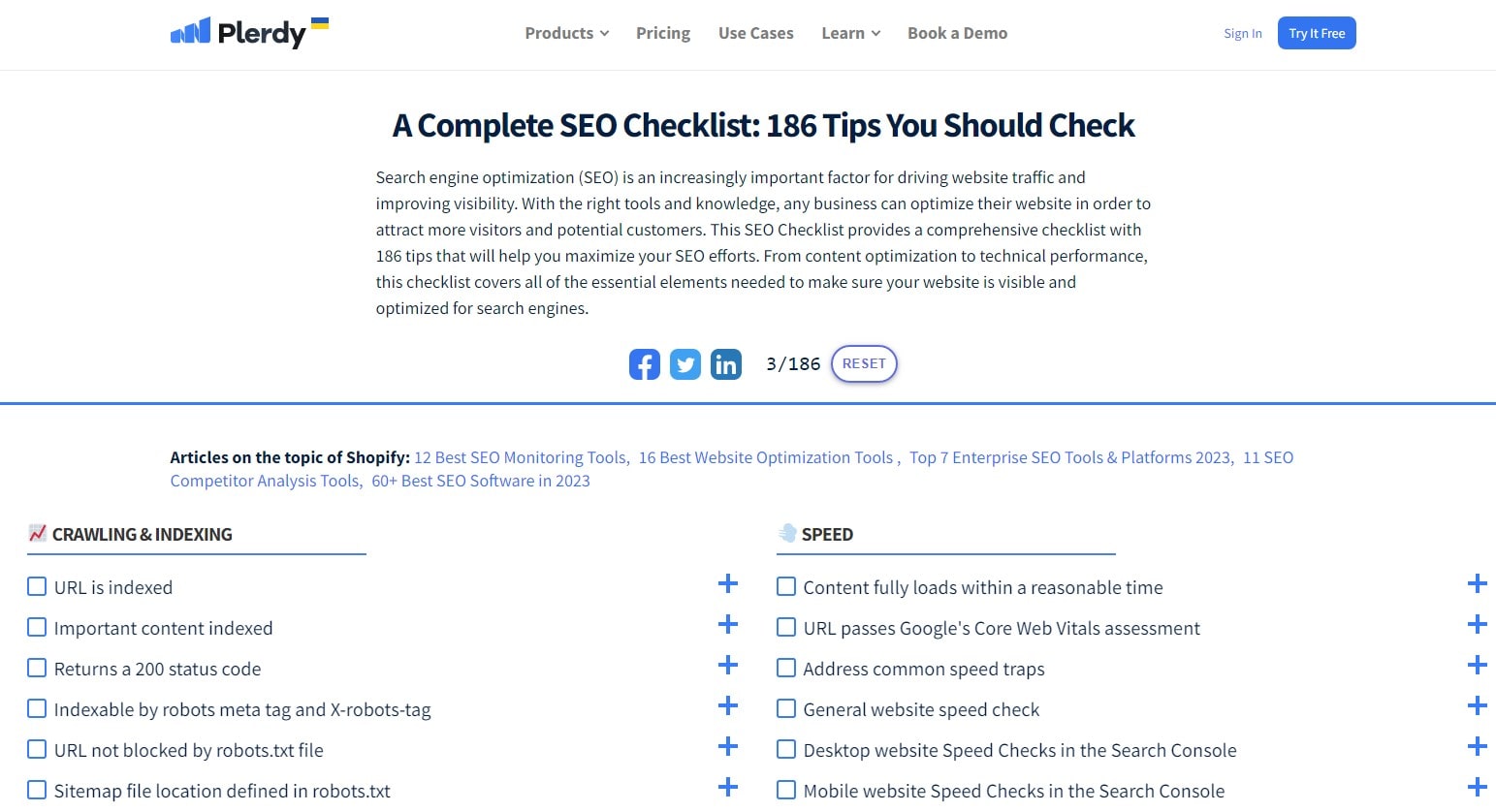Welcome to your definitive guide to affiliate marketing success!⚡ Here, we unravel 15 compelling tips to power-up your affiliate business and rake in those coveted commissions. Witness firsthand the potential to make real money? – not just a trickle, but a steady stream.
Consider niches such as wellness products or tech gadgets, each offering its unique opportunities and challenges. In this riveting read, you’ll discover:
- Artful strategies to amplify your earnings
- Key considerations when picking your affiliate programs
- Effective ways to drive traffic and boost conversion rates.
Furthermore, don’t forget to utilize Plerdy, an innovative tool designed to supercharge your Conversion Rate Optimization (CRO) and User Experience (UX) game – it’s a must-have asset in every savvy marketer’s toolbox.
No fluff, just actionable, real affiliate marketing tips.

We’re not offering shortcuts or magic formulas; instead, we provide a comprehensive blueprint for success. You’re on the threshold of a transformative experience. Buckle up, and let’s navigate the affiliate marketing landscape together!
What is Affiliate Marketing?
Affiliate marketing—a savvy method for businesses to scale their reach and individuals to generate income. You recommend a product or tool to your online audience as an affiliate. By using a unique link provided by the business, you can track any sales made through your referral. When a purchase occurs, you earn a commission—it’s a straightforward way to make money online.
In this digital age, anyone can leverage affiliate marketing. For instance:
- Travel bloggers may recommend hotel booking services.
- Fitness enthusiasts could promote protein supplements.
- Tech reviewers might suggest the latest software or gadgets.
Each of these affiliates bridges the gap between businesses and consumers, earning a share of the profits as they do. It’s not about a hard sell—it’s about providing valuable tips and honest recommendations to your followers.
Stellar affiliate marketing also goes beyond mere sales. It’s about cultivating trust, promoting products that align with your brand, and offering genuine value to your audience. With effective strategies and smart choices, you can convert this activity from a sideline into a lucrative business venture.
Embrace the richness of opportunities in affiliate marketing—it’s your chance to make money while helping others find the products and services that benefit them.
Plerdy Affiliate Program

Dive into the Plerdy Affiliate Program—a rewarding opportunity for those savvy in affiliate marketing. This program leverages Plerdy, a user-friendly software backed by over 200 glowing reviews on G2, to enable you to earn from each referral.
To jumpstart your affiliate journey, you simply:
- Sign up for the Plerdy referral program.
- Share your unique referral link within your network.
- Reap a 50% commission for every successful sale resulting from your referral.
Plerdy stands out with its ease-of-use, top-rated heatmap feature, and comprehensive training materials, making it an appealing tool to share with your audience. To facilitate this, Plerdy provides a host of ready-to-use marketing assets like attention-grabbing banners.
Exploit the potential to earn quickly through various avenues such as freelancing platforms, blog articles, agency offerings, or even your email signature. The key to success is targeting relevant audiences with your link.
As a valued Plerdy Affiliate Partner, you’ll also need to adhere to certain guidelines. These range from permissible activities—like promoting Plerdy on social media, creating educational video tutorials and sending your affiliate link to email subscribers—to prohibited actions such as spamming referral links, falsely advertising and using your own affiliate link for purchases.
The withdrawal process for your referral earnings is straightforward, with the minimum withdrawal amount set at $200. The commission you earn can add up quickly, unlocking your earning potential. Imagine earning $40 from an $80 sale, and that tenfold with just ten customers.
Harness the power of Plerdy today and start earning with the Plerdy Affiliate Program!
Understanding the Basics of Affiliate Marketing

In a world of sharing, loving, and recommending, affiliate marketing may help people and businesses gain money. Essentially, affiliate marketing is a system where you, the affiliate, endorse a product or service to your audience, tracking any resulting sales through a unique link. When someone purchases using your link, you earn a commission—a clear-cut, efficient way to make money online.
Affiliate marketing thrives in various niches. For instance:
- A home decor enthusiast can endorse a specific brand of furniture.
- A tech-savvy individual can suggest specific software or electronics.
- A skincare guru can advocate for a unique beauty product line.
Being an affiliate, you’re the essential bridge connecting businesses with potential consumers, getting a slice of the profits for your valuable efforts.
Affiliate marketing is not solely about pushing for sales. Rather, it involves building trust, aligning with products that resonate with your personal or business brand, and providing genuine value to your audience. With the right approach and smart choices, affiliate marketing can quickly evolve from a side hustle to a main revenue stream.
Successful affiliate marketing involves a handful of key components:
- Identifying a niche that matches your passion and knowledge.
- Choosing the right affiliate programs to join.
- Creating high-quality, engaging content that incorporates your affiliate links.
- Developing a trusting relationship with your audience.
- Monitoring and adapting your strategies based on performance metrics.
By embracing these pillars, you can set yourself up for success in affiliate marketing, turning it into a vibrant revenue source. It’s an exciting journey where the potential to earn is only limited by your willingness to engage, share, and recommend—while always keeping the interests of your audience at heart. You can earn money with affiliate marketing while directing people to useful resources.
Identifying Your Niche for Affiliate Marketing

Embarking on an affiliate marketing journey is exciting—it involves creating quality content, engaging with your audience, and making money along the way. But one of the initial—and crucial—steps in this journey is identifying your niche. Choosing your niche isn’t about picking the most lucrative sector; it’s about aligning your passion, knowledge, and the demand in the market to find your sweet spot in affiliate marketing.
For instance, you might have a deep interest and understanding of outdoor gear, photography equipment, or eco-friendly products. When you align your passion with a niche, your marketing efforts don’t just become more enjoyable, but they also become authentic—an essential trait that your audience values. Your niche defines your content and your audience, setting the stage for the products or services you’ll promote.
Identifying your niche involves several steps:
- Assess your passions and interests: Think about what you love, your hobbies, or areas where you possess an in-depth knowledge.
- Research potential affiliate programs: Look for affiliate programs that offer tools or products related to your interests.
- Evaluate market demand: Use tools to gauge the demand and competition within your chosen niche.
The idea is to locate a niche where you can provide value and stand out, not one with no competitors.
Let’s consider some examples:
- If you’re a fitness enthusiast, your niche could be sports nutrition, where you endorse dietary supplements.
- If you’re a digital artist, you might delve into the software niche, promoting design tools and applications.
Finding your niche in affiliate marketing is the first step to developing a business that fits your hobbies and targets a specific audience. This alignment allows for greater engagement, trust, and in turn, a higher chance to make money through your marketing efforts. It’s about sharing your passion and earning from it.
Researching and Selecting the Right Affiliate Programs
Embarking on the affiliate marketing journey means navigating a sea of affiliate programs, each with its unique products, commissions, and conditions. Selecting the right affiliate programs is as critical as identifying your niche—it sets the tone for your content, your audience engagement, and your earning potential.
When choosing affiliate programs, you don’t want to jump into the first one that promises high commissions. Instead, evaluate carefully with your audience’s interests in mind. Here are key considerations:
- Relevance: Does the affiliate program align with your niche? If you’re a fitness blogger, a program offering sports supplements might fit better than one promoting home decor.
- Commission Structure: Examine the earning potential. High-ticket items may offer larger one-time payments, while subscription services might provide smaller but recurring commissions.
- Reputation and Quality: Is the company reputable, and do they offer high-quality products? Promoting subpar products can damage your credibility and relationships with your audience.
Test-drive your shortlist of programs. Affiliate marketers promote products they trust. Signing up, using the product or service, and understanding the user experience can offer invaluable insights.
For example, if you’re in the photography niche, you could try out various photography software or hardware affiliate programs. You could test their user interface, customer support, and overall performance, which would provide you first-hand experience when promoting these products to your audience.
Remember, the right affiliate program complements your niche, offers fair commission structures, and provides high-quality products or services. By selecting the right program, you’re setting yourself up for a successful affiliate marketing business and fostering trust with your audience—a surefire way to make money in this digital venture.
Understanding the Importance of High-Quality Content

In the realm of affiliate marketing, high-quality content is the linchpin that holds your business strategy together. Its role is quintessential—to engage, inform, and subtly persuade your audience to consider the products or software you promote. As an affiliate marketer, penning top-tier content should top your priorities.
Quality content isn’t just well-written—it’s informative, engaging, and relevant to your readers. Let’s dive into the core attributes:
- Value-Add: Your content should offer insights, solve problems, or entertain. Your tech blog could explain how to use the complicated gear.
- Audience Focused: Tailor your content to resonate with your target audience. If you’re targeting beginner fitness enthusiasts, avoid industry jargon and focus on simple, actionable tips.
- Authenticity: Promote products or services you genuinely believe in. Your audience can sense insincere endorsements—authenticity can foster trust and boost your credibility.
Amp up your affiliate marketing by incorporating storytelling into your content. Stories breathe life into product features, morphing them into benefits that your audience can relate to. For instance, if you’re promoting eco-friendly products, weave a tale about your journey towards sustainable living, highlighting how the products made a difference.
Keep in mind that the internet is saturated with content—standing out necessitates offering unique perspectives or insights. Strive for depth, not just breadth. Going beyond surface-level information can position you as a knowledgeable resource, encouraging your audience to keep coming back for more.
To cap it off, high-quality content is the backbone of affiliate marketing—it attracts, engages, and nudges your audience towards making a purchase. With consistent effort, it will pave the way for your business to grow and make money in this competitive landscape.
Building Trust with Your Audience
Trust, in the affiliate marketing landscape, is the sturdy foundation on which the entire business structure rests. As an affiliate marketer, developing a trustworthy bond with your audience is a strategic move that boosts conversions, turning casual browsers into committed customers.
Building trust is a journey, not a sprint. It’s about the consistent steps you take to exhibit authenticity, reliability, and integrity. Here are a few key strategies:
- Transparency: Be open about your affiliate relationships. An affiliate disclosure not only complies with FTC regulations but also establishes you as an honest marketer. For example, if you’re marketing skincare products, a simple disclaimer stating you earn a commission on purchases can set the right expectations.
- Quality Content: As discussed before, high-quality content that provides value enhances your credibility. When promoting fitness equipment, insightful content on correct usage or workout routines can exhibit your knowledge and commitment to helping your audience.
- Authentic Recommendations: Only endorse products you’ve tested and believe in. If you’re in the travel niche and found a particular travel insurance beneficial, share your personal experiences and the reasons why you’re recommending it.
- Responsive Engagement: Responding promptly and sincerely to comments, emails, or social media interactions shows you value your audience. Your responses shouldn’t merely be reactions—they should add value, provide solutions, or offer insights.
- Consistency: Regularly update your website or blog with fresh content. Consistency can position you as a reliable resource in your niche, be it home improvement, fashion, tech, or any other.
In a nutshell, trust-building is not about dazzling your audience with clever marketing jargon. Instead, it’s about showing up consistently, offering authentic recommendations, and delivering valuable content. By doing so, you can transform your affiliate marketing venture into a money-making business your audience respects and trusts.
Leveraging SEO for Affiliate Marketing

SEO powers organic traffic, visibility, and conversions in affiliate marketing.
Think of SEO as the catalyst that propels your affiliate marketing efforts. It can help you ascend the ranks of search engine results, attracting a larger pool of potential customers to your site. The more people find you organically, the greater your chances are of making money through your affiliate links.
To harness the full potential of SEO, consider the following strategies:
- Keyword Research: Unearth relevant, high-volume, low-competition keywords for your niche. If you’re promoting eco-friendly products, for example, identify keywords that eco-conscious consumers are likely to use. Remember, strategically placing these keywords can give your content an SEO boost.
- On-Page Optimization: Integrate keywords naturally into meta tags, headers, and body content. Avoid keyword stuffing—it’s more about the judicious placement of keywords that aligns with the overall context of your content.
- User Experience (UX): Search engines value user-friendly websites. Ensure your website opens quickly, is mobile-friendly, and is easy to navigate. A clean, minimalist design can mirror your product offerings if you’re in the tech niche.
- Backlinking: Having reputable sites link back to your content increases your domain authority. Guest posting on renowned blogs in your niche—like fitness, fashion, or photography—is a great way to earn quality backlinks.
- Evergreen Content: Create timeless content that continues to pull in traffic. For example, a comprehensive guide on choosing the best DSLR cameras can keep attracting photography enthusiasts.
SEO and affiliate marketing go hand in hand. When wielded wisely, SEO can drive your affiliate marketing business, helping you attract traffic and make money—proving it’s more than just a buzzword.
Using Social Media Platforms for Promotion
Social networking may help affiliate marketers reach potential customers, develop brand awareness, and increase conversions. Use popular channels like Facebook, Twitter, LinkedIn, and YouTube to diversify your marketing strategy.
Imagine promoting DIY woodworking tools via YouTube tutorials or endorsing the latest beauty products through Instagram stories—each platform offers unique ways to make money through affiliate marketing. Here are some stellar tips for incorporating social media into your affiliate marketing strategy:
- Create Value-Packed Content: Sharing content that educates, entertains, or informs will not only attract but also retain your audience. For example, if you’re a gourmet coffee brand affiliate, sharing brew guides or coffee pairing tips on Facebook can resonate with coffee lovers.
- Use Eye-Catching Visuals: High-quality images or videos can significantly increase engagement. A fitness affiliate marketer might share transformation photos or short workout clips on Instagram.
- Engage with Your Audience: Reply to comments, share user-generated content, or start discussions.
- Use Platform-Specific Features: Leverage features unique to each platform. For example, ‘Swipe Up’ links in Instagram stories or shoppable posts can lead directly to the affiliate product.
- Consistent Posting: Regular posting keeps your brand top-of-mind and fosters an engaged community. Use scheduling tools to maintain consistency.
- Disclose Affiliate Links: Transparency is vital in maintaining trust with your audience. Always disclose your affiliate links, as per FTC guidelines.
Social media and affiliate marketing dovetail beautifully, creating synergies that can fuel your business growth. Integrating them effectively can enhance your marketing efforts, making it an indispensable component of a successful affiliate marketing journey.
Utilizing Email Marketing for Affiliate Success

In the vibrant landscape of affiliate marketing, email marketing emerges as a potent tool for affiliates, enabling direct, personal interactions with potential customers. By weaving affiliate marketing into your email strategy, you can boost conversions and make money, all while building solid relationships with your audience.
Here’s a snapshot of how you might leverage email marketing for affiliate success:
- Cultivate a Subscriber List: Use lead magnets—exclusive content, discounts, free trials—to entice visitors to subscribe. For instance, if you’re in the health supplements niche, you could offer a free e-book on nutrition and wellness tips.
- Segment Your Audience: Delineate your subscribers based on their interests, purchase history, or behavior. A travel blogger promoting various travel gear can segment their list into backpackers, luxury travelers, and adventure seekers, tailoring content to each group.
- Craft Compelling Content: Your emails should add value to your subscribers’ lives. If you’re an affiliate for a cookware brand, share unique recipes or cooking tips. Remember to include relevant, subtly placed affiliate links.
- Personalize Emails: Personalization goes beyond addressing subscribers by their first name. Personalize your content to build trust and boost conversions.
- Test, Track, and Tweak: Monitor your email performance—open rates, click-through rates, conversions—and make necessary adjustments.
- Be Ethical: Always disclose your affiliate relationships and respect your subscribers’ privacy.
Email marketing strengthens relationships and boosts conversions in affiliate marketing. It’s not just about promoting tools—it’s about fostering relationships, delivering value, and establishing trust. Make the most of this powerful tool to steer your affiliate marketing venture toward remarkable success.
Tracking and Analyzing Your Affiliate Marketing Performance
Sailing the seas of affiliate marketing, navigating through the data ocean, and mapping your course to success takes a keen eye and the right tools. Tracking and analyzing your performance empowers you to optimize your strategies, make informed decisions, and ultimately make money.
Key performance metrics in affiliate marketing to take into account are:
- Traffic Volume: Monitor the number of visitors to your affiliate site or blog. If you’re in the skincare niche, for example, and see a surge in traffic after posting about a popular moisturizer, this could indicate a high demand for such content.
- Click-Through Rate (CTR): CTR illustrates how many visitors are engaging with your affiliate links. It measures the proportion of site visitors who click on links.
- Conversion Rate: This metric reveals the percentage of visitors who perform the desired action—purchasing a product, signing up for a service, etc.—after clicking your affiliate link.
- Average Order Value (AOV): AOV helps identify how much money customers are spending on average when they place an order through your affiliate link.
- Commission Revenue: A direct indicator of your earnings, it’s imperative to keep track of your commission revenue over time and identify patterns and trends.
To sail smoothly through your affiliate marketing journey, consider using robust tracking tools that help you dive deep into these metrics. Don’t just float on the surface—plunge into the data, uncover the insights, and let them steer your strategy. Remember, in the grand voyage of affiliate marketing, data is your compass, and analysis is your rudder. Sail wisely, and you’re bound to reach the shore of success.
The Role of Patience and Consistency in Affiliate Marketing

In affiliate marketing, tortoises win over hares. The power couple of patience and consistency plays a pivotal role in this dynamic landscape.
Picture yourself operating in the fitness niche. You won’t build a bodybuilder physique overnight, and likewise, your affiliate marketing efforts won’t yield immediate results. It’s a marathon, not a sprint – results compound over time, but only if you stick with it.
Patience lets you weather the initial dry spells, embrace the learning curve, and trust the process. It’s about understanding that success isn’t immediate – building an audience, earning their trust, and converting that into sales takes time.
Meanwhile, consistency is the fuel that drives your journey. Whether it’s consistently producing quality content, consistently engaging with your audience, or consistently optimizing your strategies, it’s all about showing up and putting in the work.
Here’s how these virtues work in harmony:
- Patience allows you to build a solid foundation – a well-designed website, engaging content, strong SEO – without rushing for quick wins.
- Consistency ensures your audience stays engaged, your SEO remains robust, and your presence doesn’t wane.
- Together, patience and consistency lead to growth – in traffic, trust, conversions, and income.
The affiliate marketing landscape may be teeming with hare-like quick schemes, but the real winners are those who understand the role of patience and consistency. Keep plowing the fields of hard work, water them with patience, and soon, you’ll reap a bountiful harvest of success. After all, Rome wasn’t built in a day, and neither will your affiliate marketing empire be.
Importance of Transparency and Disclosure in Affiliate Marketing
In the competitive landscape of affiliate marketing, where trust is your golden ticket to make money, transparency and disclosure stand as twin pillars of success.
Let’s take the travel niche as an instance. If you’re promoting a top-tier hotel through affiliate marketing, clarity about the relationship benefits everyone involved – you, the business you’re promoting, and most importantly, your audience.
Transparency implies being upfront about your affiliate relationships. It communicates honesty and respect for your audience, fostering a bond of trust that can inspire loyalty and engagement. Your audience understands that you benefit from their purchases, and they’re typically okay with it – as long as you’re honest.
Then comes disclosure – the act of revealing your affiliate links. Legally required in many jurisdictions, it not only boosts your credibility but also safeguards your business from potential pitfalls.
Together, transparency and disclosure:
- Foster trust and loyalty among your audience.
- Safeguard you legally.
- Help maintain your reputation as an honest marketer.
- Increase the likelihood of conversions as people appreciate your honesty.
Operating in the technology niche? Don’t just shove affiliate links into your gadget reviews. Clearly state your affiliate relationships, disclose when links are affiliate links, and keep your audience’s interests at heart. Be a guide, not a salesperson.
In the realm of affiliate marketing, those who shine a light on their operations tend to attract a more engaged, trusting audience. It’s an approach that earns respect and pays dividends in the long run. Remember, honesty isn’t just a moral virtue; in affiliate marketing, it’s a solid business strategy.
Using A/B Testing to Improve Affiliate Marketing Results
In the affiliate marketing business, you don’t leave things to chance. A/B testing (split testing) helps you create money by aiding decision-making. It’s about testing two versions of your marketing material to see which performs better, helping you fine-tune your efforts.
Let’s dive into the health and wellness niche for a moment. Suppose you’re pushing an affiliate link for a popular protein supplement. You design two versions of an email marketing campaign – one with a more casual tone and playful visuals, another adopting a more serious, scientific approach. By sending each version to a split audience, you can track which resonates more and results in higher conversions.
Adopting A/B testing can:
- Aid in understanding what resonates with your audience.
- Increase conversions by refining your tactics.
- Reduce risk by basing decisions on data, not gut feelings.
- Foster continual improvement in your marketing strategy.
Now, imagine you’re in the fashion industry, promoting a clothing line. You could use A/B testing to experiment with different styles of product descriptions, various call-to-action placements, or even alternate site designs. With each test, you gain insights into what your audience prefers and responds to.
In affiliate marketing, the goal isn’t merely to toss out links and hope for the best. It’s about strategic adaptation, continual learning, and improvement. By incorporating A/B testing into your approach, you can make more informed decisions, refine your strategy, and boost your revenue. It’s not a guessing game – it’s a calculated path to success.
Leveraging the Power of Networking and Partnerships

In affiliate marketing, networking and partnerships cannot be underestimated. It can create a ripple effect that expands your reach and scales your earnings exponentially. Strong relationships aren’t merely nice-to-haves – they’re must-haves.
Take the travel industry, for instance. As an affiliate marketer promoting vacation packages, a partnership with a popular travel blogger could skyrocket your exposure. They weave your affiliate links into their travel guides, and in return, you offer them exclusive deals. It’s a win-win.
Leveraging networking and partnerships can:
- Widen your audience beyond your own followers.
- Add credibility to your promotions when backed by trusted partners.
- Create synergies that elevate your business and theirs.
- Boost earnings as your affiliate links find their way to new customers.
Dipping into the realm of home decor, suppose you’re endorsing chic furnishings. Partnering with an interior design influencer can lead to your affiliate links featured in their home makeover vlogs, providing exposure to an engaged audience.
At the core of affiliate marketing is the ability to create and nurture relationships. Connecting with other marketers, influencers, and even competitors can lead to mutually beneficial partnerships that amplify your reach and enhance your income. It’s not a solo endeavor – it’s a collective journey towards success. Think beyond your individual efforts, engage with your community, foster partnerships, and watch your affiliate marketing business grow. Networking and connections are essential to a successful affiliate marketing firm in this competitive digital market.
Scaling Your Affiliate Marketing Efforts
Scaling affiliate marketing efforts is akin to creating a snowball effect – start small, build momentum, and watch it multiply as it rolls down the hill. There’s no magic switch to flip. It involves strategic planning, an understanding of what works, and an appetite for smart risk-taking.
In the tech gadgets niche, if your review blog has been successful in promoting a particular brand of smartphones, why not expand into related products? Laptops, smart home devices, fitness trackers – the options are plentiful. Analyzing your past successes and applying the lessons learned can help pinpoint lucrative opportunities for expansion.
To scale your affiliate marketing efforts, consider these tactics:
- Diversify your product portfolio – Branch out into complementary products or services to maximize earning potential.
- Automate and delegate – Invest in tools to streamline processes and outsource tasks to free up your time for strategic planning.
- Optimize high-performing content – Identify what works and double down on these strategies.
- Leverage partnerships – Expand your reach and access new audiences by forming strategic alliances.
For instance, if you’re in the fitness niche endorsing workout equipment, you could broaden your scope to include nutrition supplements, workout apparel, or even fitness programs. Diversifying your affiliate product portfolio can open up additional income streams and buffer against potential downturns in any one area.
Ramping up your affiliate marketing business isn’t about working harder – it’s about working smarter. By understanding what’s driving your success, investing in the right tools and people, diversifying your offerings, and leveraging partnerships, you can propel your business forward, multiply your earnings, and carve out your success story in the competitive affiliate marketing landscape. It’s all about laying the right foundation and then building upon it to scale your business and make money.
The Future of Affiliate Marketing
The affiliate marketing landscape – dynamic, vibrant, and ever-evolving – stands on the brink of an exciting future, shaped by advancements in technology and shifts in consumer behavior. Harnessing these shifts can offer a gold mine of opportunities for those who are ready to adapt and innovate.
Take, for example, the green living niche. As sustainability becomes a global movement, affiliates can ride this wave by promoting eco-friendly products, leveraging increased consumer awareness, and commitment to greener choices.
What does the future hold for affiliate marketing? Here’s a sneak peek:
- Deeper data analytics – Big data will enable affiliates to tailor their strategies with unprecedented precision, leading to better conversion rates.
- Artificial Intelligence (AI) – From predictive analytics to automated customer interactions, AI will open up innovative ways to engage audiences and convert leads.
- Personalization – Consumers crave personalized experiences. Affiliates who can deliver this will surge ahead.
- Multi-platform strategies – Affiliates will need to seamlessly integrate multiple platforms – think social media, blogs, email, and mobile.
In the burgeoning market of subscription box services, affiliates could harness AI to predict which boxes would appeal to which audience segments. They could then tailor their promotions accordingly, significantly boosting conversion rates and earning potential.
Ultimately, the future of affiliate marketing lies in embracing change, continuously learning, and staying ahead of consumer trends. It’s about adapting and innovating – whether it’s leveraging AI, utilizing data analytics, or personalizing marketing efforts. The key is to never rest on your laurels – what works today might be obsolete tomorrow. Affiliate marketing is not for the faint of heart – it requires a commitment to continuous growth and a willingness to take smart risks. But for those who dare, the future is ripe with opportunities to make money and leave a mark on the business landscape.
Conclusion
Navigating the vast ocean of affiliate marketing ?, these 15 tips served as your compass, illuminating the path to monetizing your business successfully. To maintain your momentum and take the next step, leverage Plerdy’s potent SEO & UX analysis tool ?️, pending to make your marketing journey easier. You’re not just text in the affiliate marketing hub but a persistent player ready to get your slice of the pie. Printful of promise, your campaigns can resonate with users and sell your ideas like hotcakes. Remember, every email, every ad, every user interaction is a potential gold mine ?. In this sea of endless opportunities, merchants are eager for dedicated, passionate partners like you. You’re not just an affiliate; you’re an entrepreneur set to leave your mark. Go ahead, write your own success story. Dive into the exciting, fast-paced world of affiliate marketing today. Building something you can be proud of is more important than simply getting money. So, take a breath, give it your all, and let Plerdy be your guide on this exhilarating journey. Make your move now ?!
